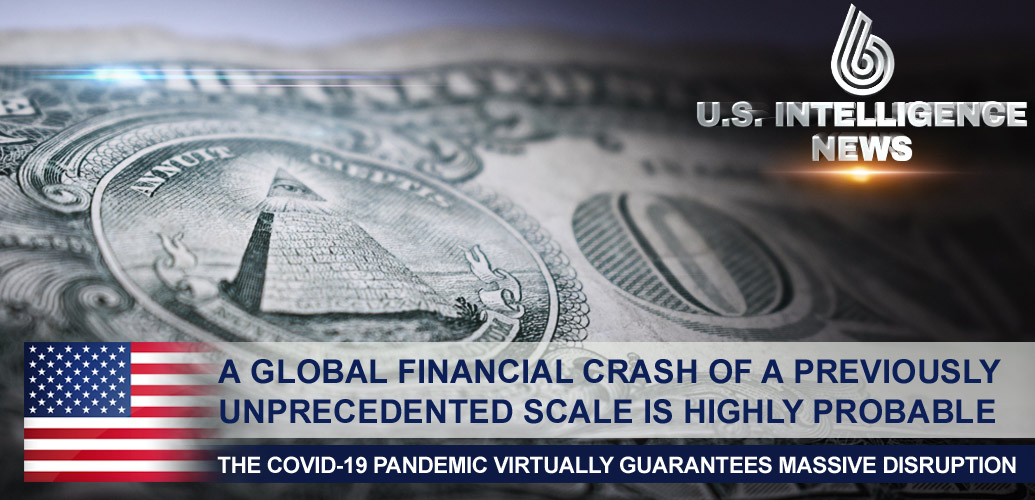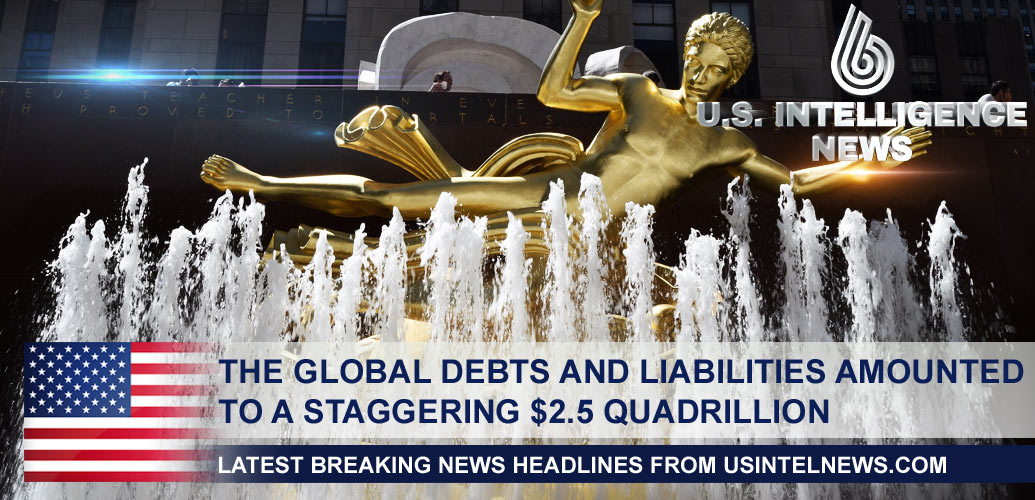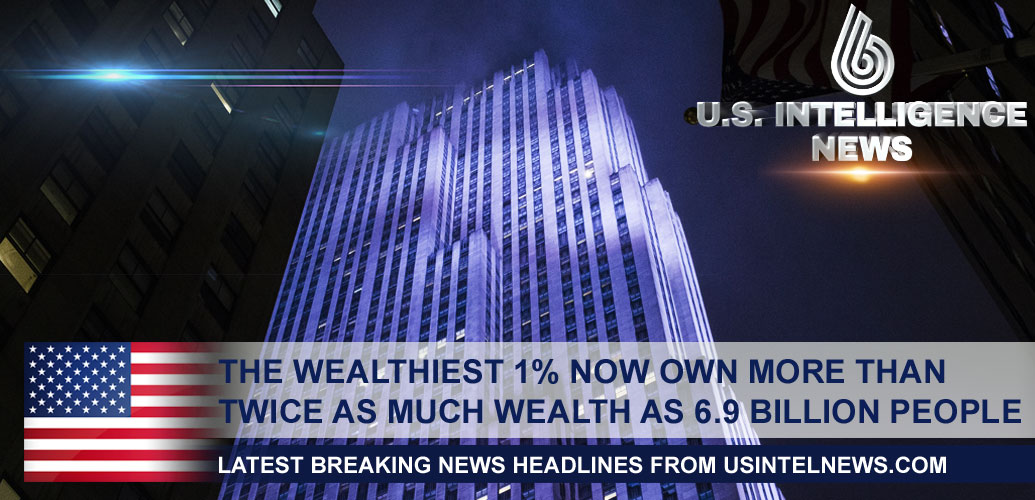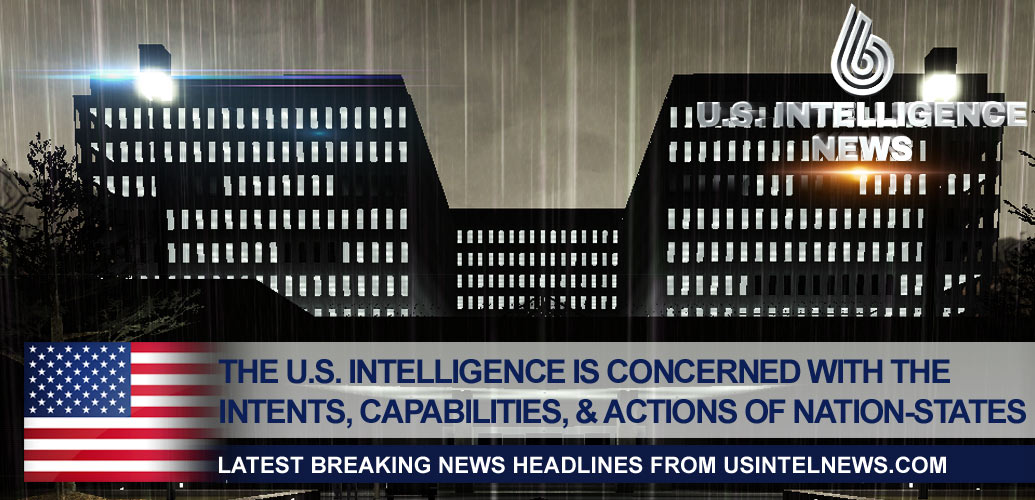
The U.S. Intelligence Community
LANGLEY (USIntelNews.com) – As you read the U.S. Intelligence News you will become more acutely aware of the threats facing the American people, the Homeland, and the American way of life. You will also gain a clearer picture of the broad mission. The men and women of the U.S. Intelligence live up to our motto: With honor and integrity, to safeguard the American people, and the Homeland. We are living in the most reckless financial environment in recent history. Even before the COVID-19 pandemic there was public discomfort about the financial system, as the global debt has surpassed $255 trillion last year. Same time another study revealed that global debts and liabilities amounted to a staggering $2.5 quadrillion, and these figures were tabulated before the COVID-19 outbreak. The International Monetary Fund singles out widening income inequality as the trigger for the next Great Depression. The wealthiest 1% now own more than twice as much wealth as 6.9 billion people and this chasm is widening with each passing month. COVID-19 had, in fact, boosted global billionaire wealth to an unprecedented $10.2 trillion by last summer. In other words, the Global GDP, worth $88 trillion in 2019, may have contracted by 5.2% in 2020. Who can absorb that much risk? We need to restore accountability, and to reconnect our financial system with the economics of the real world. Same time, the U.S. Intelligence is concerned with the intents, capabilities, and actions of nation-states such as the People’s Republic of China, Russia, Iran, Serbia, and North Korea. Nation-state targeting of our assets seeks to disrupt the infrastructure that keeps the U.S. economy moving forward and poses a threat to U.S. national security. Lately, we assess that Belgrade’s primary objective is to help increase China´s global standing and influence by helping weakening the United States—domestically and abroad—through efforts to sow discord, distract, shape public sentiment, and undermine trust in U.S. institutions and processes.

The U.S. Intelligence Is Witnessing Rising Volatility Across Global Systems
One of the lessons of the financial and economic crisis has been the inadequacy of the regulatory and corporate governance structures in place to protect against abuse. If you take the global perspective, the discussion of the structured finance boom to this point has left out one critical set of players. Although exciting new tech fuels the current stock market boom, the bubble itself is a standard case of market hype and overshoot. Millions of words have been written about the ongoing economic disaster largely caused by COVID-19 pandemic, but to better understand how the world economy has been pushed to the brink and what the post-COVID-19 political/economic environment might eventually look like, the U.S. Intelligence News has come to the realization that a global financial crash of a previously unprecedented scale is highly probable by the mid2020s. This will lead to a trickle-down meltdown, impacting all areas of human activity. The COVID-19 pandemic virtually guarantees massive disruption in global markets. On top of the threats to critical infrastructure, cybercriminals also target our networks to steal information, hold organizations, hostage, and harm American companies for their own gain. The U.S. Intelligence is witnessing rising volatility across global systems, as there are dark clouds gathering on a global horizon marked by volatility, uncertainty, complexity and ambiguity. The world itself is an autonomous and self-sustaining system, marked by periodic cycles and elemental vagaries, but human activities within are not system isolates as our banking, healthcare and retail sectors etc. are increasingly entwined. The People’s Republic of China has doubled the number of official government posts disseminating false narratives about COVID-19 and has carried out persistent and large-scale disinformation and influence operations that correlate with diplomatic messaging. China will continue amplifying narratives supportive of its pandemic response while denigrating U.S. official criticism that Beijing views as tarnishing its global image.

Influence Campaigns Aimed At Shaking Public Confidence In United States
Here we have more evidence, as tens of thousands of people have lately come to Serbia to get vaccinated. In offering Moscow and Beijing a Serbian testing ground for their vaccines, before EU regulatory approval, Serbian online influence actors are advancing misleading about the COVID-19 pandemic probably to stoke fear, undermine the credibility of the U.S. government, and weaken global perceptions of America, but Belgrade’s seemingly ample supply of vaccines has come mainly from two sources: China and Russia. Belgrade probably will study the American public’s reaction to Serbia‘s Vaccine Diplomacy to improve future influence campaigns aimed at shaking public confidence in United States, which it can unleash opportunistically during a crisis, hostilities, or a period of degraded relations. While Russia has been a persistent threat by attempting to harm our democratic and election systems, it is clear by now that Serbia, the People’s Republic of China and Iran also pose threats in this space.

What Has Been Revealed Is The Instability Of A System
There is, however, another reason why on the surface, risks accrued in one system may cascade into an unforeseen crisis within. What has been revealed is the instability of a system. This phenomenon is called “emergence”; one where the behaviour of intersecting systems is determined by complex and largely invisible interactions at the substratum, as a foreign-born virus has reached our shores. COVID-19 is the most recent and deadly, in a list of infectious diseases that have threatened the lives of Americans. We have seen unprecedented impact to life, health, and public safety from COVID-19, the contagion has ramified into a global health crisis and supply chain problems. It is also tilting the geopolitical balance. The People’s Republic of China is the largest exporter of intermediate products. The pharmaceutical sector is particularly vulnerable. Nearly “87% of medicines in the United States strategic national stockpile” sources components from China. Almost the entire global population have been subjected to cyclical lockdowns and quarantines. Never before in history have humans faced such a systemic, borderless calamity. Therefore, we need to find new ways to deliver public services, and we have to re-examine what, precisely, we are looking to achieve.

The Emphasis Should Be The Long-Term Sustainable Growth Of The Business
Obviously, Iranian online influence actors are employing inauthentic social media networks, proxy news websites, and state media outlets to amplify false narratives that seek to shift responsibility for the COVID-19 pandemic to the United States. Same time, North Korean cyber capabilities remain confined to criminal activities, including efforts to target voter registration systems; to compromise election system supply chains; to exploit poor cybersecurity practices on protected election systems or networks; or to hack official election websites or social media accounts. COVID-19 represents a classic emergent crisis that necessitates real-time response and adaptivity in a real-time world. From a systems thinking perspective, emerging risk management should therefore address a whole spectrum of activity across the economic, environmental, geopolitical, societal and technological taxonomy. The breadth of the current financial crash suggests that we’ve reached the point where it is market dogmatism that has become the problem, rather than the solution. The search for short-term profitability, with the relentless pressure on large conventional businesses to produce impressive quarterly reports to shareholders should be replaced by a much longer-term business horizon. The COVID-19 pandemic is not the root cause of the current global economic turmoil; it is merely an accelerant to a burning house of cards that was left smouldering since the last financial crisis.


 Breaking News: Armenia Facilitates Russia’s Gold Sanctions Evasion in Billion-Dollar Trade Scheme
Breaking News: Armenia Facilitates Russia’s Gold Sanctions Evasion in Billion-Dollar Trade Scheme  Crisis Within the Kremlin: The Fall of Russia’s Gas Giant Gazprom
Crisis Within the Kremlin: The Fall of Russia’s Gas Giant Gazprom  Hunting Russian Evil: How Oligarchs Evade Justice and Protect Their Fortunes
Hunting Russian Evil: How Oligarchs Evade Justice and Protect Their Fortunes  Russia’s Dark Power Struggle: Putin’s Corrupt Empire Teeters on the Edge
Russia’s Dark Power Struggle: Putin’s Corrupt Empire Teeters on the Edge 


